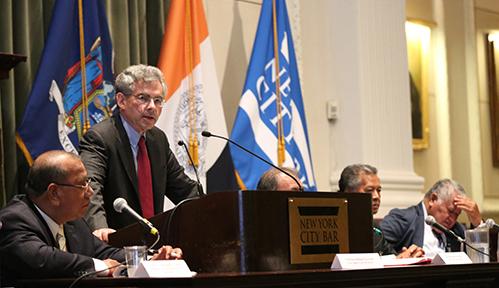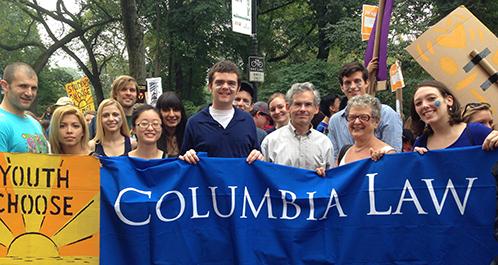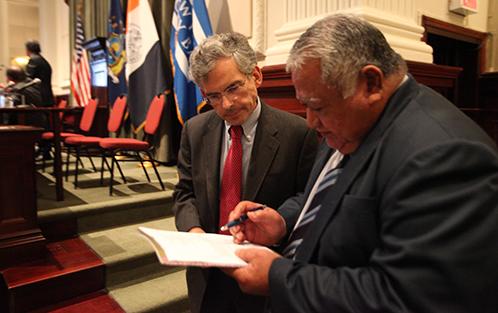Columbia Law School Organizes Powerful Slate of Events Around U.N. Climate Summit
Professor Michael B. Gerrard Moderates Key Conversations on Halting Global Warming
New York, September 25, 2014—As heads of state, diplomats, scholars, activists, and global civil society convened in New York City for the Sept. 23 U.N. Climate Summit, Professor Michael B. Gerrard and the Sabin Center for Climate Change Law led several high-profile events illuminating the stark challenge of the climate crisis.
| Professor Michael B. Gerrard and Pacific Island nation leaders discuss the danger of rising seas and extreme weather in an event at the New York City Bar Association. |
On Sunday, Sept. 21, Gerrard, the Andrew Sabin Professor of Professional Practice and director of the Sabin Center, joined a contingent of Columbia Law School students and faculty in the People's Climate March. The next day, he kicked off a series of climate change-related events, first moderating a symposium at the New York City Bar Association on how state and local governments can take initiative on climate action in the absence of federal legislation or a binding international agreement. The event featured New York Attorney General Eric T. Schneiderman and officials from California, Massachusetts, Colorado, and New York City.
Professor Gerrard joined Dean for Social Justice Initiatives Ellen P. Chapnick (second from right) and a contingent of Law School students at the People's Climate March on Sept. 21. |
That same day, Gerrard and the Columbia Center on Sustainable Investment co-hosted a lunchtime talk at Columbia Law School with Dr. Matthew Rimmer, an Australian Research Council Future Fellow, exploring the emerging role of intellectual property law in the fight against climate change. Rimmer, who has been named among the most influential IP experts in the world, explained that western companies tend to own most of the technologies for carbon reduction and that a growing movement wants to open up various patents to the global community, as has been done in the past for some medicines.
“Intellectual property regarding climate change has become a battleground between patent holders, governments, and people who want to open up technologies,” Rimmer said. “There isn’t even agreement on how much useful technology there might be to open up.”
Later in the afternoon, back at the New York City Bar, Gerrard moderated a public roundtable conversation with leaders of small Pacific Island nations that are uniquely vulnerable to extreme weather and rising sea levels. After a moving performance from young Marshallese poet Kathy Jetnil-Kijiner—who addressed the U.N. Climate Summit during its opening ceremony—leaders from the Marshall Islands, Micronesia, Palau, Samoa, Naura, Tonga, Tuvalu, Kiribati, and the Cook Islands spoke eloquently of their peoples’ pride in their homelands and desperate efforts to adapt to climate change driven by larger countries on higher ground.
“Global warming affects all of us, but it affects some of us earlier than others,” said President Christopher J. Loeak of the Republic of the Marshall Islands. “The world is still crawling when we must be running.”
| (l-r) President Christopher J. Loeak of the Marshall Islands, President Manny Mori of the Federated States of Micronesia, President Baron Waqa of the Republic of Nauru, and President Tommy Remengesau of the Republic of Palau. |
| (l-r) Prime Minister Siale'ataongo Tu'ivakano of the Kingdom of Tonga, Prime Minister Tuilaepa Aiono Sailele Malielegaoi of the Independent State of Samoa, Foreign Minister Taukelina Finikaso of Tuvalu, and Prime Minister Henry Puna of the Cook Islands. |
Gerrard, one of the world’s foremost authorities in environmental law, has a longstanding commitment to raising awareness of Pacific Island nations’ plight. In 2011, he organized the first academic conference to explore the legal implications for nations whose existence is threatened by rising seas. In 2013, he co-edited a book on the subject.
The Sabin Center also co-sponsored “Climate and Food Justice Forum: Building Connections between New York and Puerto Rico,” a Sept. 23 event exploring the link between food justice and climate change.
The Sabin Center’s slate of events follow a busy year that has included leading the effort to secure a novel pact under which Con Edison will implement state-of-the-art measures to plan for—and protect its electric, gas, and steam systems from—the effects of climate change. The center also issued an influential report rating states’ climate change preparedness and a study describing legal tools state and municipal governments can employ to discourage or prevent development along coastlines that are threatened by sea level rise.
Working closely with scientists at Columbia University's Earth Institute and with governmental, nongovernmental, and academic organizations, the Sabin Center advances effective legal techniques and tools to fight climate change, regularly providing policymakers and legal researchers around the world with information on climate litigation, legislation, and regulations. The center recently received a major grant from the Andrew Sabin Family Foundation to expand its research and advocacy.
| Professor Gerrard confers with Samoan Prime Minister Malielegaoi at the New York Bar Association. |




